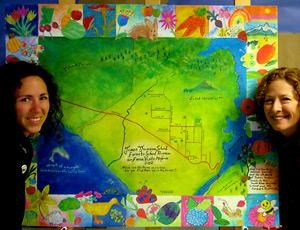Each month, students gather at James Thomson Elementary School to enjoy a simple, healthy meal prepared and served by dedicated parent volunteers, using some of the rich abundance of produce that is grown in the local area.
The Farm to School program was created in 2011 and James Thomson is the first school to develop the program in School District 47. Its location in Wildwood provides easy access to working farms and many students have had the opportunity to visit these farms and see first hand where their food is coming from.
Fruit, vegetables, fish, eggs, honey and even locally milled grains are all included, depending on the season, and information is provided to students during the meal about the nutritional value of the food and how it got from “farm to plate.”
Last year, parent coordinator of the program Francine Ulmer had the idea to create a map of these farm visits, using artwork by the students to show the diversity of the foods produced in the region. Artist and Vancouver Coastal Health Community Development coordinator Vanessa Sparrow worked with school staff and students to develop the map, which was launched as part of the school’s May Day celebrations this year.
“The map is a colourful and engaging tool that can be used by teachers to help demonstrate farm to school concepts,” said Sparrow, “as well as to educate students about broader issues of food security and sustainability.” Removable stickers of fruit, vegetables, eggs, fish, and more can be placed on the map to show where the ingredients for each farm to school meal came from.
Due to the recently created school garden and a brand new kitchen, students will have the opportunity to grow, harvest and prepare some of their own food this year as part of the program.
“Hopefully, students will be encouraged through their participation in mapping, gardening and cooking activities to eat more consciously and to become more thoughtful stewards of the food-producing land in this special region,” said Sparrow. “Perhaps some students will even be inspired to become food growers themselves.”



